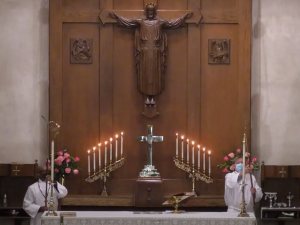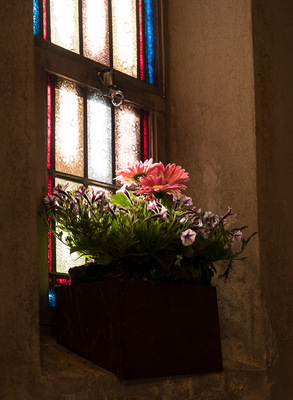Liturgical Ministries
Every worship service at St. Paul’s is the product of loving service by dozens of committed Christians who use their talents in proclaiming the glory of God. Creating meaningful worship requires a great diversity of gifts, and therefore a great diversity of people. It’s also an ideal way for a newcomer to help the church as he or she grows spiritually from the experience of helping. These ministries offer wonderful opportunities for new and older members of the parish to make use of their talents to support the splendid worship for which St. Paul’s is known. We’d love to tell you more about all this, and to learn more about you.
To get involved, contact Leon Tillery
 Acolytes
Acolytes
Acolytes play a vital part in worship by serving at the altar in various roles. An acolyte may assist by carrying the processional cross, lighting candles, holding the Gospel Book, holding candles or “torches,” assisting the priest with set up and clean up at the altar, swinging the thurible or carrying the incense boat, and any other tasks as seen fit by the priest or verger. Adults and children can serve as acolytes, with children generally starting at fifth grade.
To get involved, contact Leon Tillery
Altar Guild
The Altar Guild is a group of women and men who oversee the necessary arrangements for services. They play one of the critical roles in preparing for each service and are one of many teams that work together with the rector and verger every week to make sure the services go as flawlessly as possible.
We are looking for new folks to join this wonderful ministry. Have you ever wondered how everything seems to just be magically set up and ready for each service? It is not magic, but instead due to the efforts of a dedicated team of men and women who make this happen.
Training will be provided to all new volunteers. If you are not sure, please consider “apprenticing” on the Altar Guild. There would be no commitment but you could shadow when we are working and make a decision once you see what a great ministry it is.
To get involved, contact Cheryl Wagoner
Eucharistic Ministers
A Eucharistic minister is a lay person who assists the clergy with administering the sacraments of Holy Communion. Eucharistic ministers usually vest in cassock and surplice or an alb. Generally, they volunteer to serve and are trained by the priest, the verger or an experienced Eucharistic minister. They then are recommended by the parish priest to the bishop of the diocese, who grants them a license to practice the ministry. The Eucharistic ministers at St. Paul’s do not take their positions lightly and consider their ministry a holy responsibility.
To get involved, contact Leon Tillery
Eucharistic Visitors
Lay Eucharistic Visitors share Holy Communion with those who are unable to join us for in-person worship due to illness or impairment. Contact: Leon Tillery

Flower Guild
The Flower Guild glorifies God by enhancing the liturgy and beauty of the spaces within the church, creating floral decorations for worship services, holidays, weddings, funerals, and special events. No previous floral design experience is necessary. Training will be provided. To get involved, contact Marie Ashworth
Greeters
The Greeters play an important role in greeting everyone as they enter St. Paul’s doors, distributing welcome bags to newcomers and activity boxes to children, all in an effort to make everyone feel welcomed and loved at St Paul’s.
Contact: Tom Gerow (8 a.m. greeters)
Midge Silberman (10:30 a.m. greeters)
Lectors
Lectors read the lessons and prayers during worship.
Contact: Leon Tillery
Music
Music is integral to our worship. Our parish has a strong history of musical excellence. In addition, a variety of organ, instrumental, and choral events are offered throughout the year. Be a part of our ministry by exploring service in the choir and attending our many music events in our beautiful worship space.
Contact: Brendan Conner
Ushers
Assist in seating, receiving offerings, and distributing leaflets and books.
To get involved, contact Don Bobo
Vergers
The position of verger originated as the “Protector of the Procession” during the Middle Ages. The verger led and protected the clergy as they processed to a church or cathedral, carrying a large mace (verge, or staff) to keep away animals and disorderly crowds that might attack the clergy or procession.
Since ancient times, the verger has had many different titles and duties assigned. Today a verger can best be described as a lay assistant to the clergy. Our verger oversees preparations for the service and the liturgy and acts as a “Master of Ceremonies” in many instances, assisting the clergy in any way needed behind the scenes.
To get involved, contact Leon Tillery
